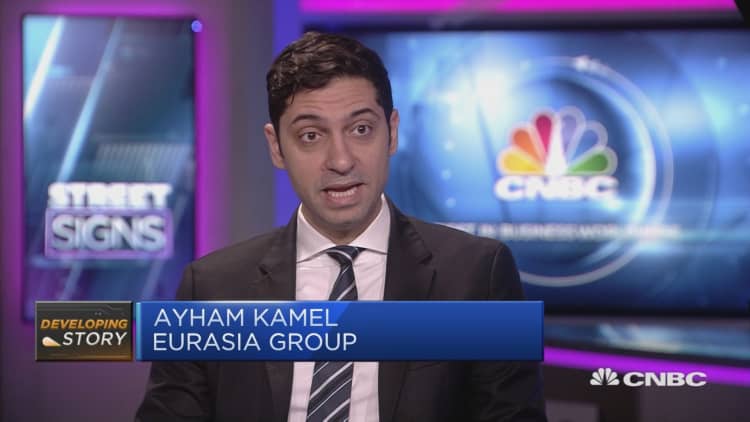Lebanese Prime Minister Saad Hariri announced his intention to resign from his position on Tuesday, nearly two weeks into mass anti-government protests that have gripped the Middle Eastern country of 6 million.
"I have reached a dead end today," Hariri said from Beirut, as he appealed to all Lebanese to "protect civil peace." He addressed the country's political parties, saying it is "our responsibility to protect Lebanon." He added that political positions come and go, but that the dignity and safety of the country was more important.
Lebanese dollar bonds extended their fall ahead of the news, with yields exceeding 30%, according to Reuters. The country's banks announced they would remain shut on Wednesday, deepening fears of a cash crisis and a chaotic run on the banks when they eventually reopen.
The protests, described as the country's largest in 14 years, have been unprecedented in their cross-sectarianism and scope. Protesters span a range of ages and include members from across Lebanon's 18 religious sects, who appear to share a similar anger at a government characterized by decades of graft, corruption and the inability to provide basic services like reliable electricity or garbage disposal.
Lebanon's debt-to-GDP stands at more than 150%, one of the highest in the world, and unemployment hovers between 35% and 40%. Lebanon is ranked 138 out of 175 countries by Transparency International's Corruption Perception Index.
A reform package promised by Lebanese Prime Minister Saad Hariri earlier this month failed to satisfy the demonstrators, who are demanding a full resignation of the cabinet and an overhaul of the country's sectarian political system.
The protests, which observers say numbered at more than a million people, have been largely peaceful. But signs of violence are emerging and many in the country fear chaos as certain parties manipulate the unrest in pursuit of their own interests. Earlier on Tuesday, a mob loyal to Shia Muslim political parties Hezbollah and Amal attacked and destroyed a protest camp built by anti-government protesters, Reuters reported.
Hezbollah, financially backed by Iran and designated a terrorist group by the U.S., is considered the most powerful party in Lebanon's government and won a comfortable victory in the country's last parliamentary elections in 2018, its first elections in nine years. Hariri, a Sunni Muslim, served as prime minister since 2016 and previously from 2009 to 2011.
'Do everything to ensure stability'
France's government has called on all parties to help preserve Lebanon's unity and stability. French Foreign Minister Jean-Yves Le Drian addressed Lebanese authorities in a statement, saying, "Prime Minister Hariri has resigned just now, which makes the crisis even more serious. France calls for Lebanese officials to do everything to ensure stability of institutions and the unity of Lebanon. It is paramount."
Lebanon has long been the ground where larger powers' proxy battles for regional influence play out. The small country of 6 million is home to 18 different religious communities thanks to arbitrary border-drawing by French generals, who established the state in 1926. Lebanon won independence in 1943, maintaining a French-inspired system of pluralistic democracy.

Its unique consensus government, tailored to deal with a diverse population, rests on a power-sharing structure whereby the prime minister, president and speaker of the house must come from the country's three largest religious groups: Sunni, Maronite Christian and Shia, respectively.
Regional powers often exert influence in the country through these various groups.
Lebanon hasn't been under this much economic pressure since its bloody 15-year civil war ended in 1990 and left an estimated 120,000 killed. Increased political instability — in a country hosting more than 1 million Syrian refugees and where government mismanagement has led to daily power cuts and piles of uncollected garbage on the streets — could be the breaking point that pushes the country to default, economists fear.
On Monday, Central Bank Governor Riad Salameh told Reuters that the country needs to solve the crisis within days to avert a future economic collapse.


